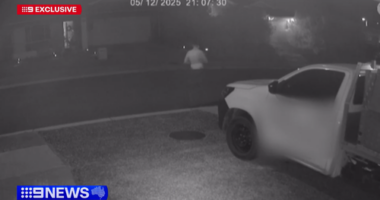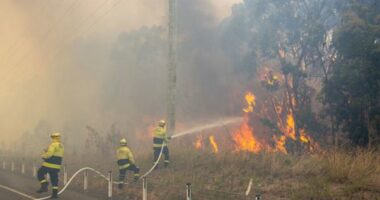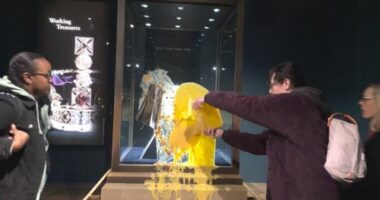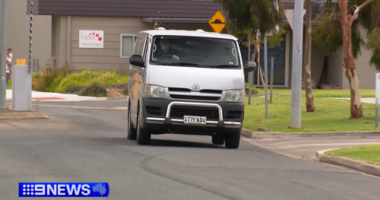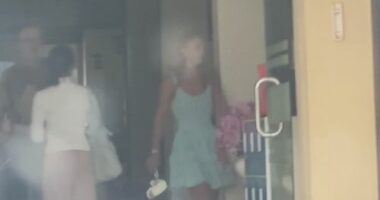Share this @internewscast.com
A Sydney-based Islamic preacher wasn’t referring to all Jewish people when he made allegedly inflammatory remarks in a series of speeches, a court has heard.
Wissam Haddad took the stand in the Federal Court on Wednesday in a case brought by the nation’s peak Jewish body, the Executive Council of Australian Jewry’s (ECAJ) co-CEO Peter Wertheim and deputy president Robert Goot.
They allege remarks made in these speeches, which came in the wake of Hamas’ October 7 2023 attack on Israel, contain “gratuitous insults and antisemitic tropes” and have breached the Racial Discrimination Act.
Haddad denies the breach.
The court heard that Haddad, in a lecture series titled The Jews of Al Madina, referred to Jews as “vile”, treacherous”, “descended from apes and pigs”, and “hiding like the rats that they are”.
Under cross-examination, Haddad told the court he spoke about references to Jews in the Quran and Hadith at the time of the Prophet Muhammad, because “the events that took place … those certain events are still taking place now in Israel or Palestine”.
He said he was referring to “Jews of faith, not ethnicity”, and quoting religious scriptures with stories about interactions between Jewish and Muslim people in the 7th century.
Counsel representing the ECAJ, Peter Braham SC, asked Haddad if his “intent was to describe the eternal character of the Jewish people”.
Haddad denied that he did, saying: “I was talking about the Jewish people that are in power in Israel.”
Haddad was grilled about why he said in one speech “there is no difference” between Zionists and Jews.
“There is no such thing as Zionists at the time of the Prophet”, Haddad said.
He clarified that his intention was not to label all Jewish people as “mischievous” or “murderous”, but mentioned that such terms can be used if they are found in religious texts.

Deputy president of the Executive Council of Australian Jewry, Robert Goot, and co-CEO Peter Wertheim were seen arriving at the Federal Court on Monday for the trial’s first day. Source: AAP / Bianca De Marchi
Key legal question: Were Haddad’s comments public or private?
The case before Justice Angus Stewart centres on five speeches made by Haddad, also known as Abu Ousayd, from November 2023 at the Al Madina Dawah Centre in Bankstown, which he co-founded, and later posted online where they have received thousands of views.
Applicants Wertheim and Goot are seeking the removal of the allegedly racist speeches and injunctive relief to prevent Haddad from engaging in similar activity.
To prove a breach of the Racial Discrimination Act, the applicant’s lawyers must establish the speeches were made “otherwise than in private”.
Haddad was questioned by Braham about the context in which he gave the speeches and the various social media accounts connected with the Al Madina Dawah Centre and Haddad in a personal capacity.
The court heard Haddad has around 10,000 followers of an Instagram account under the name Abu Ousayd, and the Al Madina Dawah Centre has had and promoted social media accounts including Facebook, YouTube, Telegram, Rumble and Soundcloud.
When asked by Braham, Haddad agreed that “one of the purposes the sound and video recordings were being made was to allow publication on the YouTube channel”, but denied he had any personal involvement in uploading the videos.
Haddad’s barrister, Andrew Boe, argues, Haddad’s acts were private as he was speaking to a “Muslim audience”, and Jewish Australians only saw Haddad’s remarks through the mainstream media, or on a social media outlet “dedicated to publishing antisemitic content”.
Braham defended his line of questioning, following an objection by Boe.
“A very large part of the respondent’s case is that these speeches were delivered in private to a purely Muslim audience, and it wasn’t reasonably likely they would come to the attention of the broader community,” Braham told Justice Stewart.
“That is absolutely not how this man has run his life … just about everything that happens at the Al Madina Dawah Centre is designed and calculated for public consumption and to create or attract controversy.”
Braham questioned Haddad about the Al Madina Dawah Centre’s YouTube account being taken down from time to time, and the court heard the account has “never been reopened” after “the speeches, the subject of these proceedings, went up onto [YouTube] in November 2023.
Haddad was also asked about comments he made about other religions before 7 October 2023.
“Do you remember describing Hindus as worshippers of cows and monkeys?” Braham asked.
“You recognise seeing in mid-April 2023 on MEMRI TV, an article and video showing you describing Jews as descendants of pigs and monkeys and Hindus as being worshippers of cows and monkeys?” Braham asked.
Haddad responded: “Yes”.
‘Perceived as antisemitic’
Haddad’s lawyers argue his comments about Jewish people have not been heard in their entirety and, taken out of context, were “perceived to be antisemitic” by members of the Jewish community.
The court heard from a series of lay witnesses from Australia’s Jewish community who were cross-examined about how Haddad’s speeches first came to their attention and their feelings of safety in Australia as Jewish people.
One witness, Robert Kay, said he first formed the opinion Haddad expressed antisemitic views and was inciting violence against Jews through media reports.
“I didn’t see the speeches as they were delivered, only the reporting of them,” Kay said.
“The first time I saw reference to the speeches or quotes from them was when I read extracts in The Australian newspaper.”
Another witness, who cannot be named for legal reasons, said he also first became aware of Haddad’s speeches from articles in The Australian.
“That caused you to form the view that Mr Haddad was an extremist … and a supporter and friend of terrorists, is that correct?” Boe asked.
The witness agreed that he then formed the view that characterisation was true.

